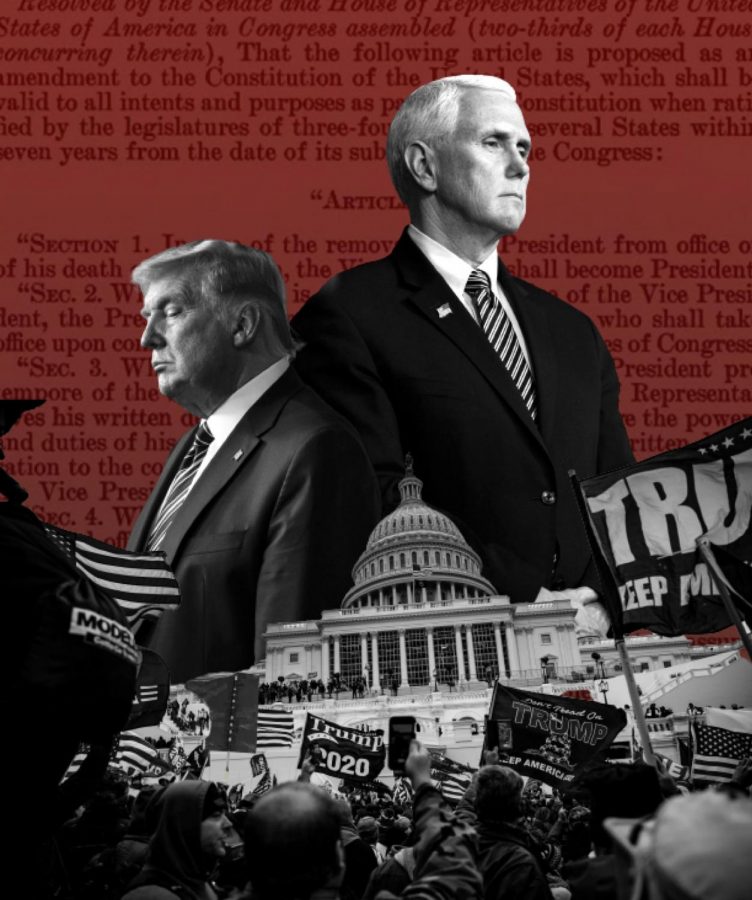The Consequences of Not Holding Political Criminals Accountable
January 28, 2021
Congress needs to send a message: domestic terrorism has no place in the United States, especially if that terrorism was instigated by the President. Without the 25th Amendment, America is doomed to continue its failures in holding powerful criminals accountable. Following the insurrection at the Capitol incited by President Donald Trump, multiple members of Congress expressed an urgency to enact the 25th Amendment. Lawmakers also called for a second impeachment trial, which would make Trump the only president to be impeached twice in American history. Both options to remove Trump from office have different processes and results. While an impeachment trial is lengthier and requires congressional support in both houses, the 25th Amendment is enacted with the support of Vice President Mike Pence and the cabinet. By putting the amendment in place, Trump would be considered “incapacitated,” resulting in Pence holding presidential powers and responsibilities until President-elect Joe Biden takes office.
The 25th Amendment is divided into four sections; however, section four is what dictates the ability of the Vice President (VP) to revoke the President’s powers. Following a written declaration by the VP, the section explains that the usual powers held by the President are to be transferred to the VP, now called the “Acting President.” Although Trump would not lose his title as the President, he would hold no power. One of the motivations behind enacting the amendment would be to ensure that Trump possesses no ability to further endanger the safety of Americans.
Another argument supporting the usage of the 25th Amendment is to set a precedent: inciting violence shouldn’t be an American value, and has consequences. If the government were to let Trump exit his presidency without any formal condemnation or recognition of his crimes, less deterrence would exist for future politicians. Unfortunately, this pattern of crime and misconduct without repercussions is prevalent in America’s political culture. For example, in response to the Orlando mass shooting in 2017, the Federal Government took no action to ban assault weapons, and only verbally condemned the actions of the shooter. The following year, the Las Vegas shooting occurred, proving to be even more deadly than Orlando. If the government had taken immediate action after the Orlando shooting, the events in Las Vegas would have been less likely to occur. The current culture in the United States revolves around outwardly denouncing dangerous affairs, yet taking no actual initiative to make change. Shifting this culture is reliant on actions such as the potential enactment of the 25th Amendment.
Those who oppose executing the 25th Amendment argue that it is not worth it. The amendment only takes away the President’s powers, not his title. Opponents also contend that the insurrection was not provoked by law but by Trump’s informal address to the crowds. They argue that formal action would do nothing to deter the President’s ability to rally his supporters and continue to incite crimes against the state. However, his actual ability to do so is weak. Various social media sites have already banned Trump, meaning he has no platform to make false claims or stir the pot. Although this argument indicates that the problem does not lie with the extent of the President’s power, but with Trump individually, it does not take into account the cultural significance that enacting the amendment would present.
As the country transitions from four years of dishonesty, misinformation, and embarrassment in the executive office, the American people deserve more than just an apology. No congressperson—Republican or Democrat—has made any tangible effort to support the Capitol riots. It is clear that being anti-insurrection is a bipartisan ideal: but that is not enough. The country does not only need every Senator and Representative to publicly denounce the insurrection; the country needs to know that this will never happen again. Even more so, the country needs to be sure that similar actions in the future will be met with immediate consequences. Every American needs to know that the actions of President Trump were unpresidential, unconstitutional, and criminal. To solely wait out the rest of his term without taking formal action would be to lay the groundwork for future instability.











